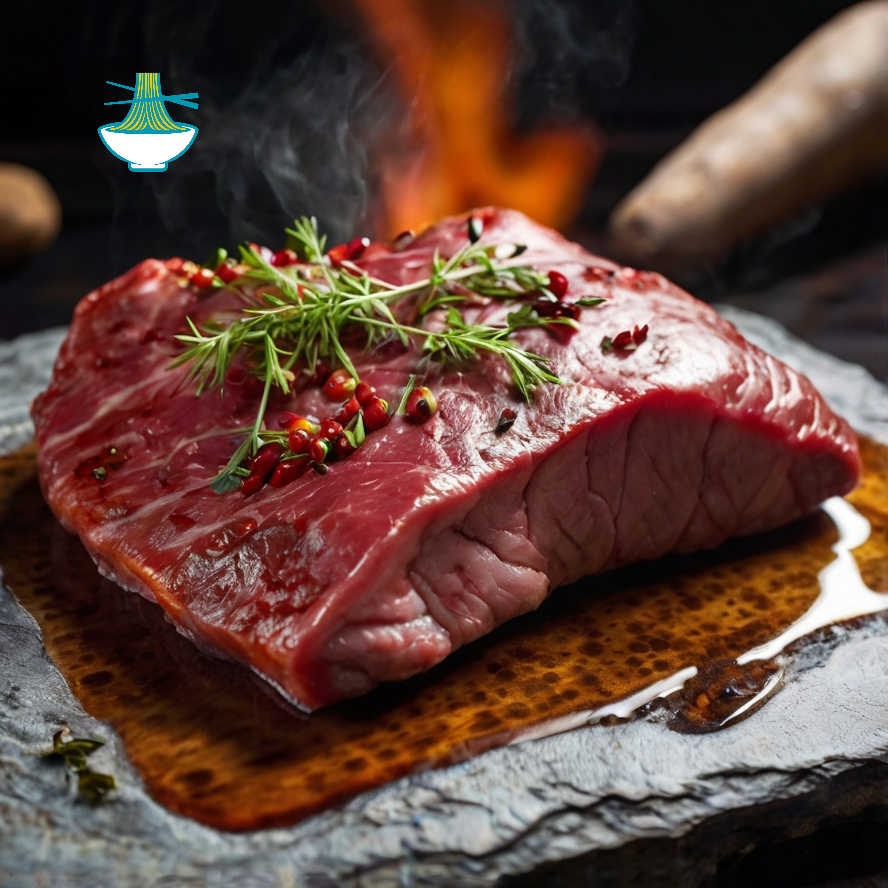Boodog, a traditional Mongolian dish, involves cooking meat inside the skin of an animal, usually goat or marmot, using hot stones. The process infuses the meat with unique flavors and ensures even cooking. Historically, Boodog has roots in nomadic Mongolian culture, where resources were scarce, and cooking methods needed to be innovative. Today, it remains a cherished part of Mongolian culinary heritage, celebrated for its rich taste and cultural significance.
Ingredients:
1. Meat (goat or marmot)
2. Hot stones
3. Salt
Method:
1. Clean the animal skin thoroughly.
2. Stuff the meat into the skin, seasoning with salt.
3. Place hot stones inside the stuffed skin.
4. Sew or tie the skin tightly to encase the meat and stones securely.
5. Allow the meat to cook slowly over the hot stones until tender and thoroughly cooked.
6. Once cooked, remove the stones and serve the meat hot.
Nutrition Value:
1. Meat (goat or marmot):
- Calories: Varies depending on cut and preparation method, generally around 200-250 calories per 100 grams.
- Carbohydrates: Negligible, less than 1 gram per serving.
- Protein: Rich source, approximately 20-25 grams per 100 grams.
- Fat: Varies, but generally lean, around 10-15 grams per 100 grams.
- Sodium: Depends on seasoning, typically minimal in unseasoned meat.
- Cholesterol: Moderately high, around 60-70 milligrams per 100 grams.
- Vitamins: Contains B vitamins (B12, niacin, B6) important for energy metabolism and iron absorption.
- Minerals: Good source of iron, zinc, and selenium, crucial for immune function and metabolism.
- Nutritional Benefit: High-quality protein source, rich in essential nutrients like iron and zinc, which support various bodily functions including muscle growth, immune health, and oxygen transport.
2. Hot stones:
- Calories: None, as they are inedible.
- Carbohydrates: None.
- Protein: None.
- Fat: None.
- Sodium: None.
- Cholesterol: None.
- Vitamins: None.
- Minerals: None.
- Nutritional Benefit: Hot stones are used solely for cooking and do not contribute to the nutritional content of the dish. However, they provide indirect heat for cooking the meat, ensuring thorough cooking and imparting a unique flavor to the dish.
3. Salt:
- Calories: None.
- Carbohydrates: None.
- Protein: None.
- Fat: None.
- Sodium: High, approximately 2,300 milligrams per teaspoon.
- Cholesterol: None.
- Vitamins: None.
- Minerals: Primarily sodium.
- Nutritional Benefit: Salt adds flavor to the dish and helps enhance the natural taste of the meat. However, excessive consumption of salt can contribute to high blood pressure and other health issues, so it should be used in moderation.


Comments